The first rays of dawn break over the mountains as Naseer Mir Ahmad begin his morning. A brisk two-kilometer walk through his neighborhood, the crisp air filling his lungs as he mentally prepares for the day ahead. For Naseer, a counsellor educator with Doctors Without Borders India/ Médecins Sans Frontières (MSF) in Kashmir, each day brings new stories of struggle, resilience, and healing.
“Sometimes I have to plead with the taxi drivers,” he chuckles, recounting his daily commute. “They won’t leave until every seat is filled, no matter how late I’m running. I’ve learned to negotiate—’I’ll pay for the empty seats, just please start driving!'”
Today, like most days, Naseer will listen to experiences that few others ever hear—intimate confessions of fear, grief, and hope that unfold within the walls of his counselling room in one of the three Primary Health Centers (PHCs) where he works.
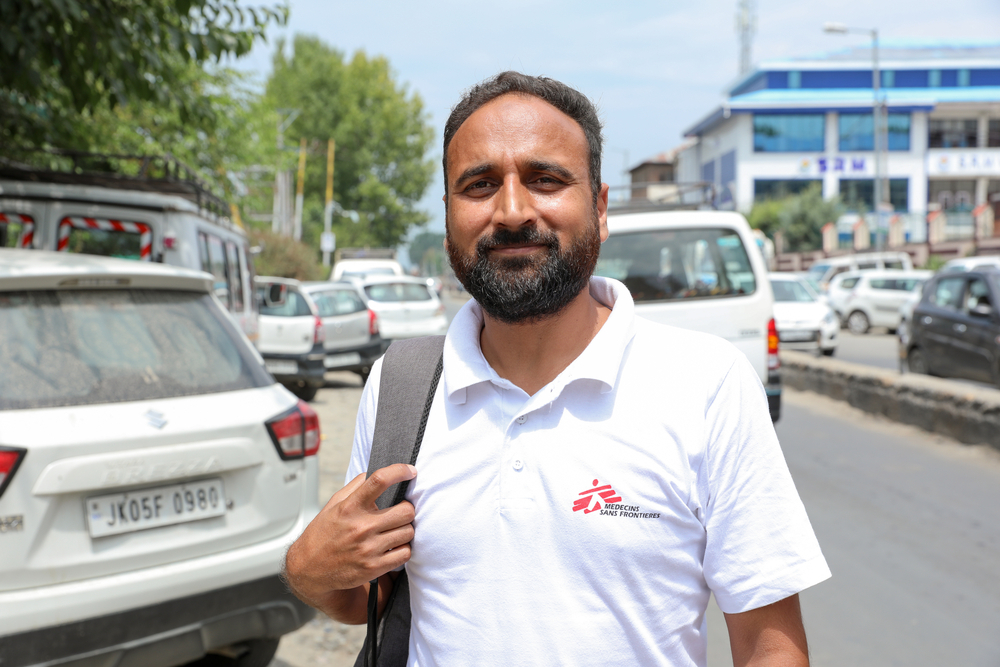
The Moment That Changed Everything
Naseer still vividly remembers the encounter that set him on this path sixteen years ago. He was a young man then, riding a crowded local bus from Baramulla to his home.
“The bus was packed—fifty or sixty people squeezed together,” he recalls, his eyes growing distant with the memory.
The other passengers stared awkwardly or looked away. But Naseer couldn’t forget her face, her voice, her obvious pain.
Troubled by the encounter, he approached his twelfth-grade teacher the next day. “Sir, I saw something strange on the bus yesterday,” he explained, describing the woman’s behavior. His teacher had no answers.
“That’s when I started digging through whatever medical literature I could find,” Naseer says, leaning forward in his chair. “I discovered this was likely a psychiatric condition. But I was from an arts background; I couldn’t study medicine. Then I learned about psychology, where I could explore these issues and perhaps help people like that woman on the bus.”
This curiosity eventually led him to pursue psychology studies and, in May 2021, to join MSF. “The journey from that bus ride to this counselling room was long,” he reflects, “but somehow it feels like a direct path.”
Behind the Veil: Stories of Stigma
The afternoon sun filters through the window as a woman in a full veil enters Naseer’s counselling room. Only her eyes are visible, darting nervously as if expecting to see someone she knows.
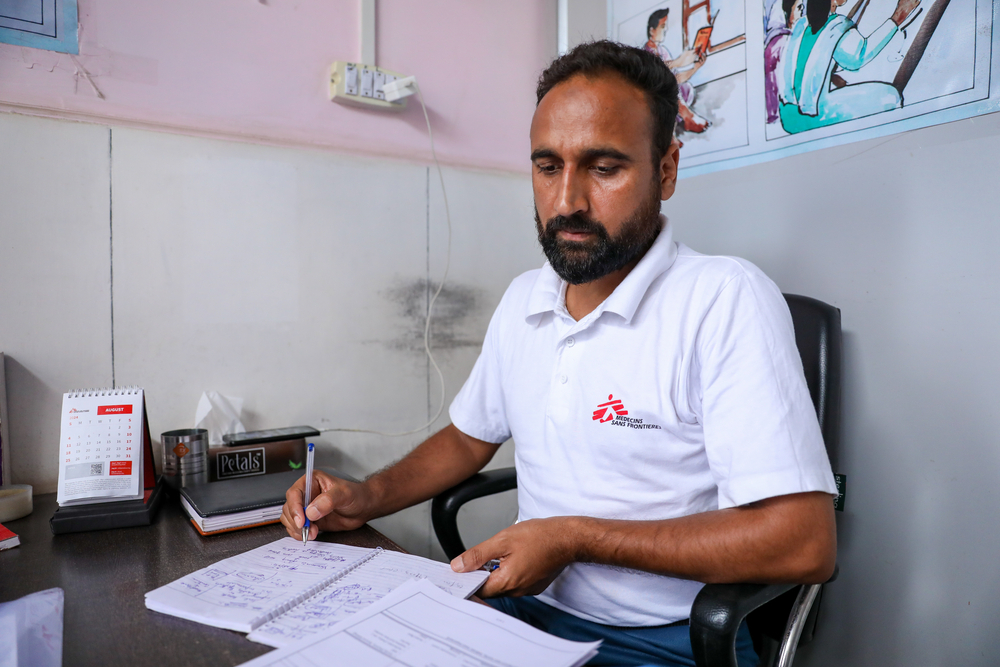
“She wasn’t always veiled like this,” Naseer explains later. “Her mother forced her to wear it for counselling sessions. ‘If people see you coming here,’ her mother had warned, ‘no one will marry you.'”
The fear of being seen seeking mental health support is so strong that elaborate deceptions become necessary. Naseer recalls another woman who arrived with her mother, both wearing veils and face masks. “The mother told everyone they were visiting a chest specialist because they had tuberculosis,” Naseer says, shaking his head. “They’d rather admit to a physical illness than acknowledge seeking help for mental health.”
In another village, a blind man longed for counselling but had no one to accompany him. “He lived in complete isolation,” Naseer explains. “So I visited his home multiple times. His family was terrified that neighbors would gossip about why someone was visiting their son.”
During these home visits, the man confided in Naseer: “I stay alone all day in my room. I don’t know what the world is like anymore. I’m confined to these four walls with no idea what’s in front or behind me.”
Yet amidst these challenges, Naseer sees signs of progress. He smiles as he describes a recent scene at a local hospital. “A pharmacist, doctor, nurse, and other staff members were there. When a person came in, they’d simply say in Kashmiri, ‘You should go for counselling.’ Whether the person had an obvious mental health issue or not—they were normalizing it.”
This represents remarkable progress from when Naseer first started, when doctors would challenge him: “You’re just going to talk to them? How will that heal anyone?” Now, these same doctors call him early Monday mornings: “Naseer sahib, I’ve reserved six patients for you today. Do you have time?”
A Village Transformed
The road to one of the villages in Sopore winds through rolling hills and scattered settlements. When Naseer first visited this community three years ago, he got lost trying to find his way.
“Nobody knew me or MSF,” he recalls, laughing at the memory. “I took the wrong route and ended up somewhere else entirely. Even when I finally arrived, people were suspicious—’Who is this outsider asking questions?'”
But on a recent visit, something remarkable happened. As Naseer stepped off the bus, two men immediately recognized him from across the street.
“Sir! Are you well?” they called out. “The counselling has made such a difference for us. I’m even sharing what I’ve learned with others in our village!”
One of the men pulled Naseer aside. “Sir, I want you to know—I used to think anyone seeing a psychologist must be crazy. But after our sessions, I understand we all struggle sometimes. Now when my wife gets upset, instead of dismissing her, I ask what’s bothering her. We talk about it.”
This transformation didn’t happen overnight. It came through building relationships with local leaders, demonstrating consistent care, and respecting cultural norms while gently challenging harmful beliefs.
“We’re now seeing referrals from everywhere,” Naseer says with quiet pride. “Community stakeholders, doctors, schools—even teachers are sending fifth-grade students, saying ‘This child complains of headaches; please check if it’s psychological.'”
A Day of Healing Conversations
By 9:30 AM, Naseer has reached his assigned MSF PHC for the day. His phone is already buzzing with messages from patients confirming their appointments.
“I schedule them carefully with small breaks in between,” he explains, settling into his chair and reviewing his notes. “Those few minutes to drink water or visit the washroom are essential.
Each patient brings their own emotional weight, and carrying all those stories requires moments to breathe.”
The door opens, and a young man enters hesitantly. It’s his first visit.
“Welcome,” he says warmly, gesturing to the chair across from him. “I’m Naseer, a counsellor here—not a doctor. That means we’ll be talking about what brought you here today.”
He notices the man’s nervous glance toward the door.
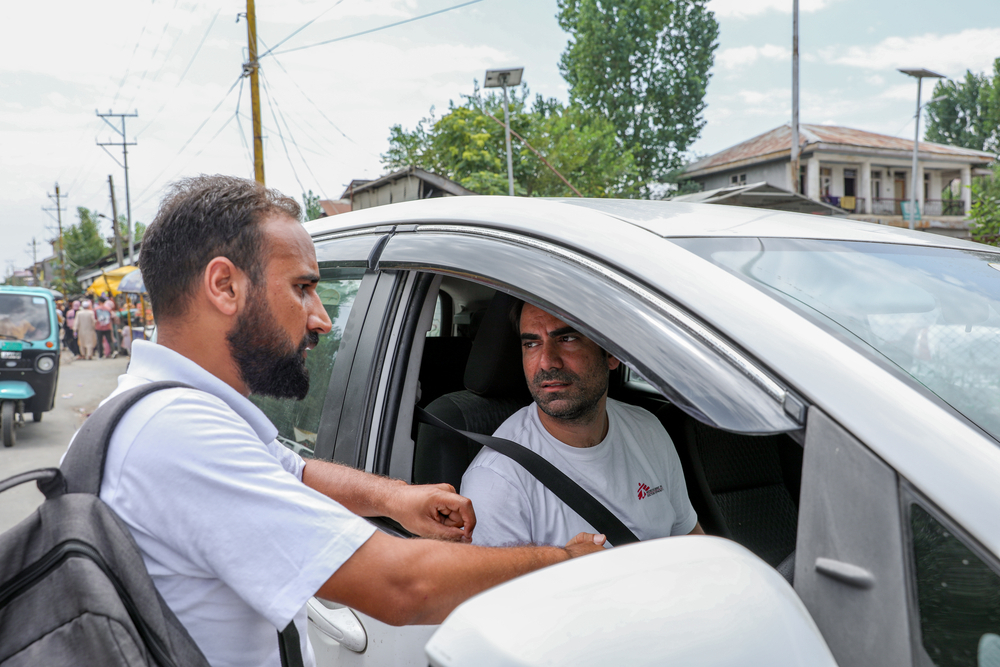
The tension in the young man’s shoulders eases slightly as he continues: “Many people come to us with chest pain, headaches, trouble concentrating, or changes in appetite. These can be signs that something is affecting your mental wellbeing. What brings you here today?”
Gradually, the story emerges—a relationship breakdown, family pressure, sleepless nights. By acknowledging each concern without judgment, Naseer creates a space where the young man begins to open up.
“In the first session, some people share very little,” Naseer explains later. “But by the second session, they’re telling me things they’ve never told anyone—not even their parents or closest friends.”
After the day’s final session around 3:30 PM, Naseer updates patient records and prepares assessment sheets for new patients. “I try to finish everything by 4:00 PM,” he says. “I don’t want to take work home. Even if I have to stay late at the office, I need to protect my personal life.”
The Man Who Couldn’t Leave Home
Among the hundreds of patients Naseer has counselled, some stories stand out vividly—like the man who had suffered from panic attacks for twenty years.
“When he first came to me, he couldn’t travel more than two kilometers from his home,” Naseer recounts. “For two decades, his world had been confined to this tiny radius.”
The pattern was always the same. The man would reach the three-kilometer mark from his house and feel his heart racing. Convinced he was having a heart attack, he would turn back immediately.
“This wasn’t just inconvenient—it was devastating his life,” Naseer explains. “His family owned a fruit business, and as the eldest son, he should have been managing it. Instead, others had to transport their produce to market because he physically couldn’t make the journey.”
Over seven to eight sessions, Naseer worked with him on cognitive and behavioral techniques. Together, they identified the thought patterns triggering his panic and practiced management strategies.
“The transformation was remarkable,” Naseer says, his eyes lighting up. “In our final session, he proudly told me, ‘Sir, now I can travel 60 kilometers to Srinagar! Last week, I took my wife for a picnic at Shaheen—something I’d never imagined possible. And I’m personally taking our fruit to market in the tractor.'”
Another patient, a 72-year-old man, had lost his son and subsequently withdrawn from life entirely. “He was financially wealthy but emotionally bankrupt,” Naseer recalls. “The loss had shattered his world.”
Naseer began by exploring what the man had enjoyed before his son’s death—meeting people, working, engaging with community leaders. They started with the simplest activities.
“Could you take a short walk today? Could you have tea with your brother tomorrow?” Naseer would suggest. Gradually, these small steps led to bigger ones. Eventually, the man reopened his shop, reconnecting with life despite his profound grief.
The Hidden Challenges
The afternoon sky darkens as Naseer recounts the obstacles mental health workers face in Kashmir. Rain begins to tap gently against the window, mirroring the rhythm of his words.
Transportation presents another daily challenge. For his assigned PHCs in Sopore, he must plan his journey with precision.
Yet he emphasizes this is his choice. “I love work that challenges me. At the end of each difficult day, there’s deep satisfaction in knowing I’ve helped even a few people understand themselves better.”
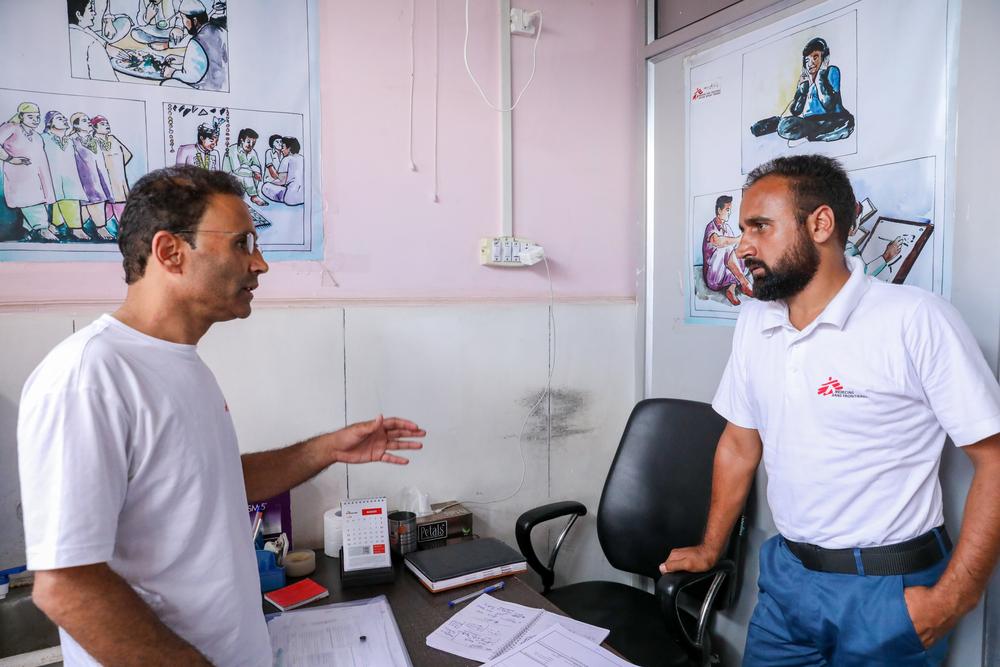
Perhaps the most delicate challenge involves helping patients discuss traumatic experiences they fear speaking about. “People don’t openly talk about things.”
He has developed subtle approaches to help patients process these experiences without explicitly stating them, creating a language of metaphor and indirect reference that allows healing to begin.
Keeping the Healer Whole
As afternoon fades into evening, Naseer reflects on how he maintains his own mental wellbeing while absorbing others’ pain daily.
His primary strategy involves emotional boundaries. “I remind myself: I am your therapist, you are my client. Our relationship has a specific purpose and timeframe—one month, two months, maximum three months. I’m here to help you find your own solutions, not to solve everything myself.”
Still, maintaining these boundaries isn’t always easy. He smiles as recalls a patient who brought juice to their session. “Patient insisted, ‘Sir, please drink it for my happiness.’ I tried to refuse politely, but the patient was so earnest. These moments test our professional boundaries.”
Outside of work, he finds balance through physical activity and social connection. “I play cricket even if I’m not very good—at least I can field! I walk at least one or two kilometers every morning. On weekends, I go to the mountains or cafés with friends.”
These activities aren’t just hobbies—they’re essential refueling stations. “When I sit with my family on Sundays, just talking and listening, I feel a motivation and energy returning. My battery recharges, ready for Monday morning.”
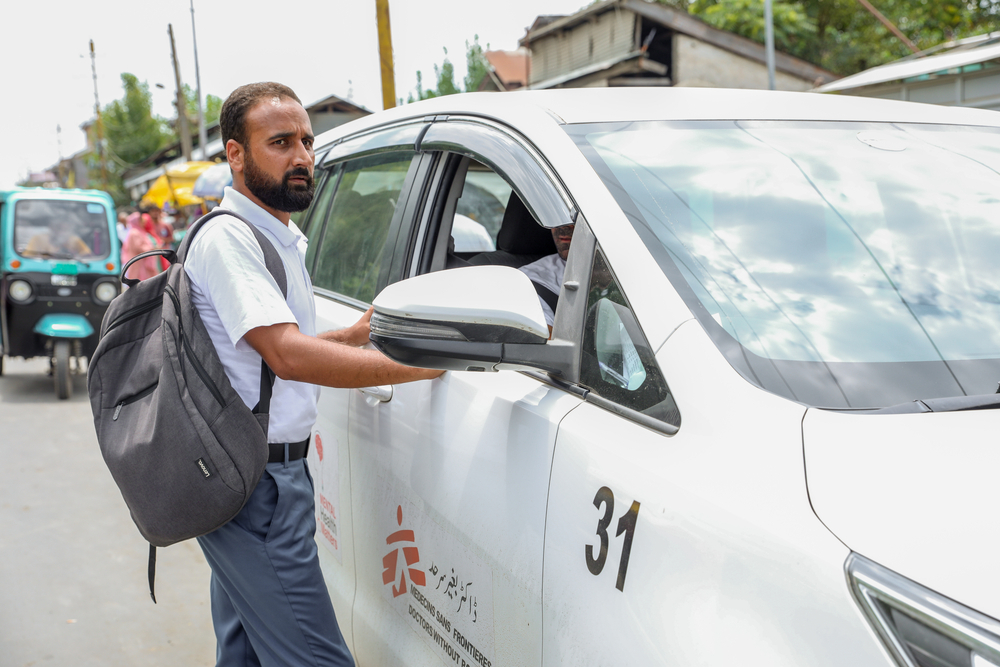
A Community Transformed
The landscape of mental health in Kashmir has shifted dramatically during Naseer ‘s time with MSF. What was once hidden is increasingly acknowledged and addressed.
“In my first year, our community health workers had to go door-to-door explaining what counselling is” he recalls. “Now, every day, at least one person comes through other referral—from family, friends, doctors, community leaders—or simply because they saw our sign and decided to seek help.”
This shift from active outreach to people independently seeking services represents a profound evolution. “Even people struggling with substance use are coming now,” he notes. “This is especially significant because it means people understand these issues have a mental health component.”
As the sun sets outside his window, he reflects on what he’s learned about human resilience through countless hours of listening to people’s deepest struggles and witnessing their capacity to heal.
“Love humanity, love yourself,” he says simply. “This is what guides me.”
It’s this philosophy that sustains his daily journey—from the two-kilometer morning walk to the challenging bus rides, through hours of intense listening, and back home again. Each day, Naseer and his colleagues at MSF continue providing free, high-quality, and confidential mental health services across Baramulla, Pulwama, and Srinagar districts.
“We don’t offer quick fixes or miracle cures,” he says, gathering his notes as the day ends. “What we offer is a space where people can be heard, understood, and guided toward their own healing. Sometimes that’s enough to change everything.”
As he steps out into the evening air, preparing for his journey home, Naseer knows tomorrow will bring new stories, new challenges, and new opportunities to make a difference—one conversation at a time.
“She wasn’t always veiled like this,” explains Naseer, Counsellor Educator with Doctors Without Borders India/ Médecins Sans Frontières (MSF) in Kashmir. “Her mother forced her to wear it for counselling sessions. ‘If people see you coming here,’ her mother had warned, ‘no one… pic.twitter.com/41ujxdzGt0
— MSF South Asia (@MSF_SouthAsia) October 27, 2025












